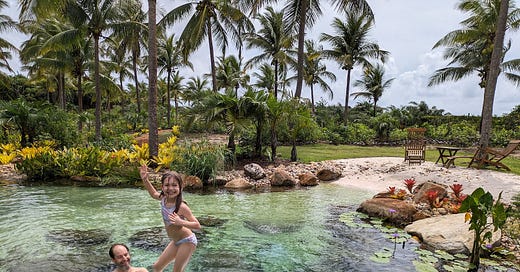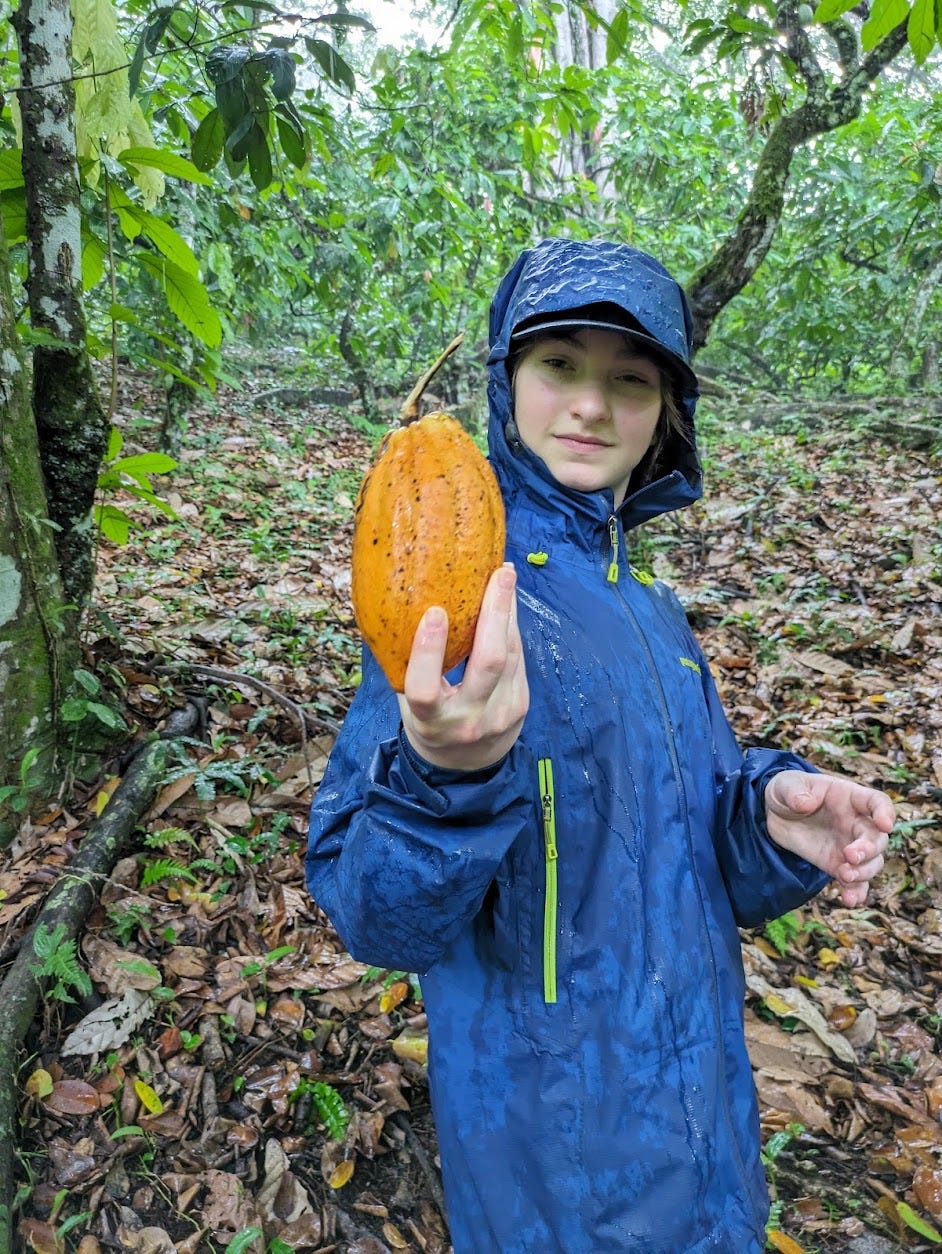I’m so nervous writing about this, I considered not doing it at all. I’m worried I won’t strike the right tone, or totally fail to be relatable and lose you guys.
But as a writer who’s sharing what I’m learning about parenting kids in the polycrisis, I feel pulled toward the messiness of my feelings. And I believe that some of what I’m turning over will be of interest to many of you.
Our family just got back from a one-week trip to Brazil.
We spent about two days in Sao Paulo, then flew to the state of Bahia. We were invited by a very generous friend who has a regenerative agroforestry business, which my husband also is getting into.
In the Brazilian context, “regenerative agroforestry” means adapting traditional techniques to produce cacao, acai, coconut, and more, while preserving maximum biodiversity and soil health in a forest setting.
This approach is a big deal because land use is both a major problem and a huge potential solution in the fight for a livable planet.
Agroforestry in Brazil presents an alternative to the notorious “slash and burn,” clearing the rainforest to produce corn, soy, and cattle in ways that strip the soil and increase flooding. It also produces food and livelihoods for people in a way that land conservation does not, which is especially important in the Global South. Part of the endeavor here is to rise up the value chain so that Brazil exports chocolate bars, for example, not primarily cocoa beans.
Our friend took us hiking on his farm, which felt more like a jungle, where we picked cacao pods from the trees and sucked the sweet-and-sour, white, stringy pulp from the beans.
We met other folks involved in agroforestry at different scales: a fifth-generation cocoa producer and chocolate crafter, and an amazing couple in their 70s, Karma and Marisa, who grow and prepare fresh “zero-carbon” acai. We ate local staples: manioc, plantains, fish cooked in coconut milk, papaya, jackfruit, passionfruit, guava, cupuacu. We drank iced mel de cacao, the complex, herbal “honey” of the cacao fruit, which few people consume very far from the equator, because it’s so sweet it ferments almost immediately.
The Mata Atlantica, the rainforest bordering the Atlantic ocean, is a global biodiversity hotspot. Very near where we were, as many locals mentioned to us, a 1996 study found 476 distinct tree species in a single 2.5-acre plot of land, the most ever recorded. A similar-sized piece of American forest might have 20 different kinds of trees.
My husband and I felt so grateful and inspired to be able to give our kids this adventure, and this vision of sustainable abundance. We swam in the ocean under a giant rainbow and frolicked in a nameless waterfall.
And we simultaneously felt guilty and like we were screwing them up.
We stayed at a fully staffed, empty luxury compound built by someone our friend knows who lives in the US and rarely visits. My big kid, known for their wisdom, said to me while we were sitting in front of the infinity pool overlooking the jungle: “This is a whole other level of wealth that I didn’t even know existed.” This, a kid who shops in thrift stores and frets over spending $100 on a pair of sneakers. She told me in that conversation that she’s actively trying to resist becoming entitled. This vacation cut directly against that.
And that’s before we get to what kind of example we’re setting by whooshing around the world for short trips on long-haul flights. We generated an estimated 9.4 tons of carbon between NYC and Sao Paulo alone.
Elizabeth Cripps, who I interviewed last year, is a moral philosopher and the author of Parenting on Earth, a rigorous, engrossing guide to parenting ethically in the face of the climate crisis. In the book, she argues that we compromise our children’s moral integrity when we raise them to be accustomed to choices that hurt the earth, like flying and eating industrially raised meat. We’re exacerbating the harm to their future, and worse, making them complicit in that harm.
Cripps has given up flying. She takes her kids only on local holidays, in the British Isles where she lives. “I flew plenty, before I thought deeply about these things,” she writes in her book. “I loved to see the world. And yes, it makes me sad that my kids can’t take that privilege for granted.”
This is jarring. I used to think of adventurous, culturally immersive travel as one of the highest expressions of my values as a parent. I have glowing childhood memories of living abroad on sabbatical with my professor parents and traveling in Israel, Italy, Mexico and France.
Now, I really don’t know. I experienced huge value from a trip like this in particular, with my kids getting to see climate solutions in action. I also see the glaring problems Cripps is pointing out. I also live a 20-hour drive away from my parents and sister, so I’m not giving up flying anytime soon.
It doesn’t sit right with me that I would actively deprive my kids of something I so love. And I want them to love this world, as much as I want them to be part of making a better one. And, I don’t want them to take our lives or lifestyles for granted.
I could go on, but I don’t want to indulge in rationalizations. I’m just going to keep examining my mixed feelings about this, and let them inform my future choices. And I’d like to hear from you, if you’re willing:
Have you limited your flying? How do you decide when to do it? And: if you have class privilege, how do you avoid raising entitled kids?
Some links
I have a piece out in MIT Technology Review about an amazing program that brought Sesame Street into refugee camps. I was able to discuss it on NPR too.
The Take podcast talked to a friend of Aaron Bushnell, the Air Force active duty service member and activist who self-immolated in protest of the war on Gaza saying he no longer wanted to be complicit in genocide.
wrote in Teen Health Today about talking to kids about Nex Benedict, the nonbinary student who died after being bullied at school. gathered some very wise ideas about how we handle it with our kids when they see someone on the street who may be homeless, dealing with mental health issues, or substance abuse.






I appreciate this reflection so much. I have these same mixed feelings. We took my son to Iceland for 2 weeks last year and it was just magical. But also, like you, I grappled with the trade off of our impact.
It’s tough. I’m nowhere near purely doing local trips. I see the importance and value so much but I also want my kid to see the world (perhaps before we can’t travel anymore 😬). What we’ve been attempting to do is slow travel, longer and less frequent trips and having conversations about why. I also think about Katharine Hayhoe’s message in “Saving Us” that the purity approach can even turn off the people among the most committed and I feel that sometimes which I’m confronting in myself as well.